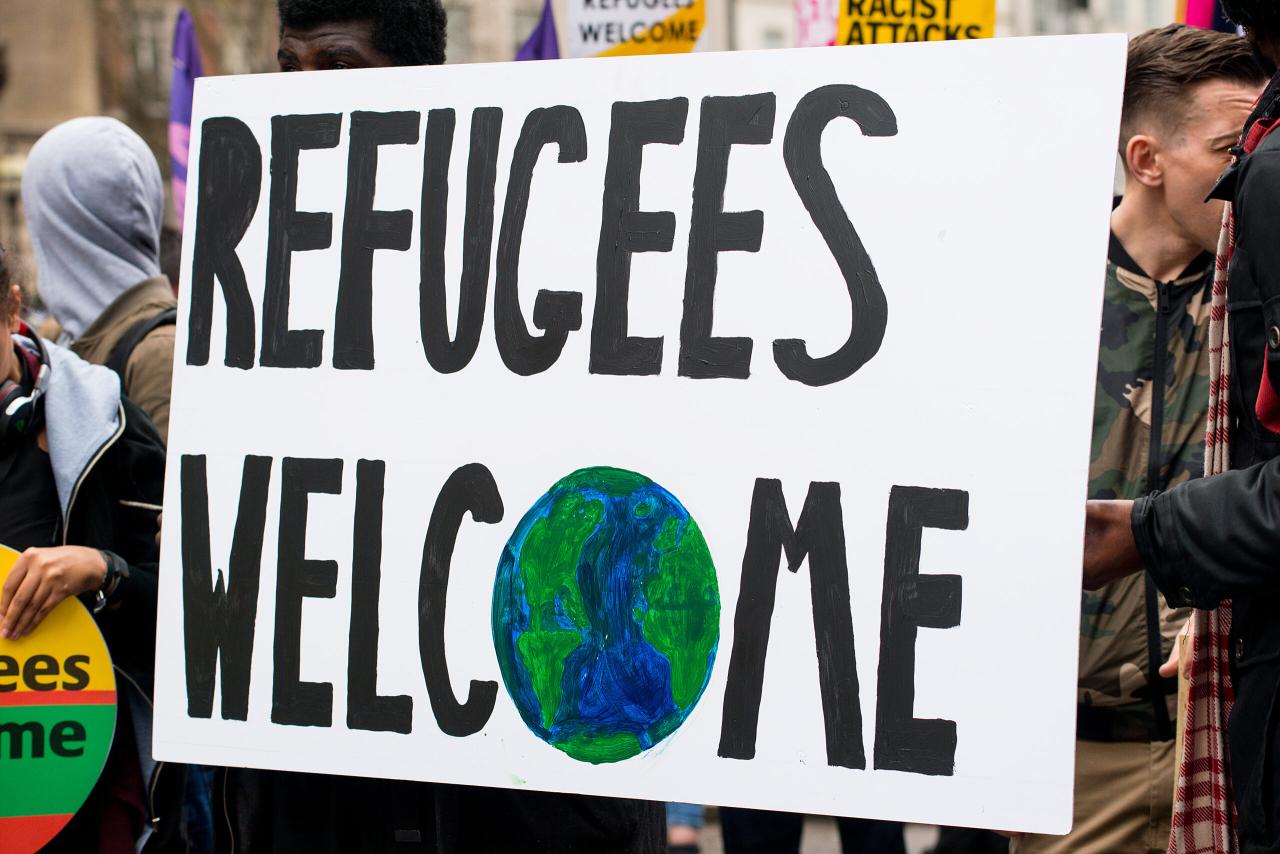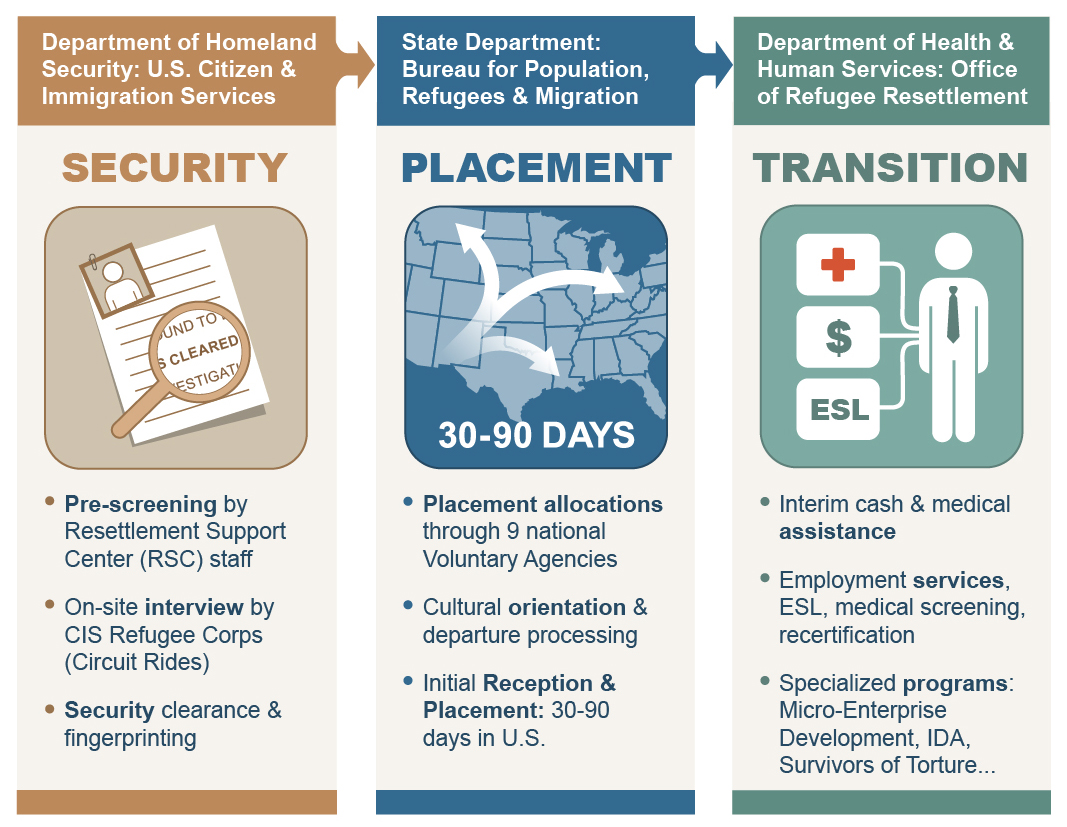As the world grapples with unprecedented displacement crises, refugee resettlement programs have emerged as a beacon of hope, providing critical support and facilitating the integration of refugees into new communities. These programs play a vital role in ensuring the well-being and dignity of those forced to flee their homes due to conflict, persecution, or disaster.
Refugee resettlement programs encompass a wide range of services, from housing and financial assistance to language training, employment support, and cultural orientation. By addressing the multifaceted challenges faced by refugees during resettlement, these programs empower them to rebuild their lives, contribute to their new communities, and achieve long-term self-sufficiency.
Overview of Refugee Resettlement Programs

Refugee resettlement programs are designed to provide support and assistance to refugees as they rebuild their lives in a new country. These programs typically offer a range of services, including housing, financial assistance, job training, language instruction, and cultural orientation.The
importance of refugee resettlement programs cannot be overstated. Refugees have often fled their home countries due to persecution, war, or other forms of violence. They may have experienced trauma, loss, and separation from their loved ones. Resettlement programs provide refugees with the opportunity to rebuild their lives in a safe and supportive environment.However,
refugees also face a number of challenges during resettlement. They may struggle to find affordable housing, learn a new language, and secure employment. They may also experience discrimination and prejudice from members of the host community. Resettlement programs can help refugees overcome these challenges and successfully integrate into their new communities.
Goals of Refugee Resettlement Programs
The goals of refugee resettlement programs vary depending on the specific program and the needs of the refugees being served. However, some common goals include:
- To provide refugees with safe and affordable housing.
- To help refugees find employment and become financially self-sufficient.
- To provide refugees with access to healthcare, education, and other essential services.
- To help refugees learn the language and culture of their new country.
- To promote the integration of refugees into their new communities.
Challenges Faced by Refugees During Resettlement
Refugees face a number of challenges during resettlement, including:
- Language barriers: Refugees may not speak the language of their new country, which can make it difficult to communicate, find employment, and access services.
- Cultural differences: Refugees may come from cultures that are very different from the culture of their new country. This can lead to misunderstandings, discrimination, and prejudice.
- Trauma: Refugees may have experienced trauma during their flight from their home country. This can lead to mental health problems, such as depression, anxiety, and PTSD.
- Lack of resources: Refugees may not have the resources they need to rebuild their lives in a new country. This can include financial resources, housing, and access to healthcare and education.
- Discrimination: Refugees may experience discrimination from members of the host community. This can make it difficult for refugees to find employment, housing, and other essential services.
Types of Support Provided by Refugee Resettlement Programs
Refugee resettlement programs provide a range of support services to assist refugees in their integration into their new communities. These services aim to address the immediate needs of refugees and empower them to achieve self-sufficiency in the long term.
Housing Assistance
Housing is a critical need for refugees, especially those who arrive with limited resources. Resettlement programs typically provide temporary or permanent housing, including apartments, houses, or group homes. These accommodations may be subsidized or provided at affordable rates to make them accessible to refugees with low incomes.
Financial Assistance
Refugees often face financial challenges upon arrival in a new country. Resettlement programs offer financial assistance in various forms, such as cash stipends, food stamps, and transportation vouchers. This assistance helps refugees meet their basic needs, such as food, clothing, and transportation, while they seek employment or establish a source of income.
Language Training
Language proficiency is essential for refugees to communicate effectively, access services, and participate fully in their new communities. Resettlement programs provide language training classes to help refugees learn the local language. These classes may focus on basic communication skills, vocabulary development, and cultural context.
Employment Training
Employment is a key factor in refugee integration and self-sufficiency. Resettlement programs offer employment training to help refugees develop the skills and knowledge necessary to secure and maintain jobs. This training may include job search assistance, resume writing, interview preparation, and vocational training in specific fields.
Cultural Orientation
Cultural orientation programs help refugees understand and adapt to their new cultural environment. These programs provide information about local customs, values, and expectations. They also help refugees connect with other refugees and members of the local community, fostering a sense of belonging and reducing isolation.
Integration of Refugees into Host Communities

Integrating refugees into host communities is crucial for their well-being and the prosperity of both the refugees and the receiving society. It enables refugees to rebuild their lives, contribute to their new communities, and foster social cohesion.
However, refugees often face challenges in integrating into host communities, including language barriers, cultural differences, limited access to employment and education, and discrimination.
Successful Integration Programs
Several successful integration programs have been implemented worldwide to address these challenges:
- Mentoring and Tutoring Programs: These programs pair refugees with local volunteers who provide support, guidance, and language assistance.
- Community Outreach and Engagement: Initiatives that foster connections between refugees and members of the host community, such as community gatherings, cultural events, and sports activities.
- Employment and Education Assistance: Programs that provide refugees with job training, language classes, and educational opportunities to enhance their skills and employability.
- Housing and Resettlement Support: Services that assist refugees in finding safe and affordable housing and navigating the complexities of resettlement.
- Trauma-Informed Care: Specialized services that address the mental health needs of refugees who have experienced trauma and persecution.
Role of Governments and Non-Governmental Organizations (NGOs) in Refugee Resettlement
Governments and non-governmental organizations (NGOs) play critical roles in refugee resettlement, collaborating to provide essential support and facilitate integration.Governments establish policies and frameworks for refugee resettlement, including legal pathways for entry, asylum procedures, and integration support. They allocate resources, coordinate with international organizations, and work with NGOs to implement resettlement programs.NGOs
complement government efforts by providing direct assistance to refugees, such as housing, healthcare, education, and job training. They advocate for refugee rights, raise awareness, and promote social inclusion. NGOs often have expertise in specific areas, such as trauma counseling or legal aid, and can provide tailored support to refugees.Effective
partnerships between governments and NGOs are crucial for successful resettlement. Governments provide the legal framework and resources, while NGOs bring expertise, flexibility, and community connections. Collaborative efforts can ensure a comprehensive approach that addresses the diverse needs of refugees.
Best Practices for Refugee Resettlement Programs
Refugee resettlement programs aim to provide support and integration for refugees as they adjust to their new lives in host communities. To ensure effectiveness, it is crucial to implement best practices that address the specific needs of refugees and foster their successful integration.
Providing Comprehensive Support Services
Providing comprehensive support services is essential for the well-being of refugees. These services should include:
- Housing assistance
- Financial assistance
- Language classes
- Job training and placement
- Healthcare and mental health services
- Education for children and adults
Tailoring Programs to the Specific Needs of Refugees
Refugee resettlement programs should be tailored to the specific needs of refugees. This includes considering factors such as their country of origin, cultural background, language skills, and education level. Programs should be designed to meet the unique challenges and opportunities faced by different refugee populations.
Engaging with Local Communities
Engaging with local communities is crucial for the successful integration of refugees. This involves building partnerships with community organizations, schools, businesses, and faith-based groups. By fostering connections between refugees and the host community, resettlement programs can promote understanding, reduce prejudice, and create a welcoming environment.
Monitoring and Evaluating Program Outcomes
Monitoring and evaluating program outcomes is essential for ensuring the effectiveness of refugee resettlement programs. This involves collecting data on program participation, outcomes, and impact. The data collected should be used to identify areas for improvement and ensure that programs are meeting the needs of refugees.
Last Point
The success of refugee resettlement programs relies on a collaborative effort between governments, non-governmental organizations, and local communities. By adopting best practices, such as providing comprehensive support services, tailoring programs to individual needs, and engaging with local stakeholders, we can create inclusive and welcoming environments where refugees can thrive.
Through these programs, we not only provide sanctuary to those seeking refuge but also enrich our societies with their diverse perspectives, skills, and resilience.
Answers to Common Questions
What are the primary goals of refugee resettlement programs?
Refugee resettlement programs aim to provide immediate assistance to refugees, including housing, financial support, and healthcare, while also facilitating their long-term integration into their new communities.
What are the common challenges faced by refugees during resettlement?
Refugees often face challenges related to language barriers, cultural differences, limited employment opportunities, and trauma experienced during displacement.
How do refugee resettlement programs promote integration?
Programs provide language training, cultural orientation, and employment support to help refugees adapt to their new environment and participate fully in society.
What is the role of governments in refugee resettlement?
Governments establish policies, provide funding, and coordinate resettlement efforts, ensuring that refugees receive the necessary support and protection.
How can individuals support refugee resettlement?
Individuals can volunteer their time, donate to organizations supporting refugees, and advocate for policies that promote refugee rights and integration.



